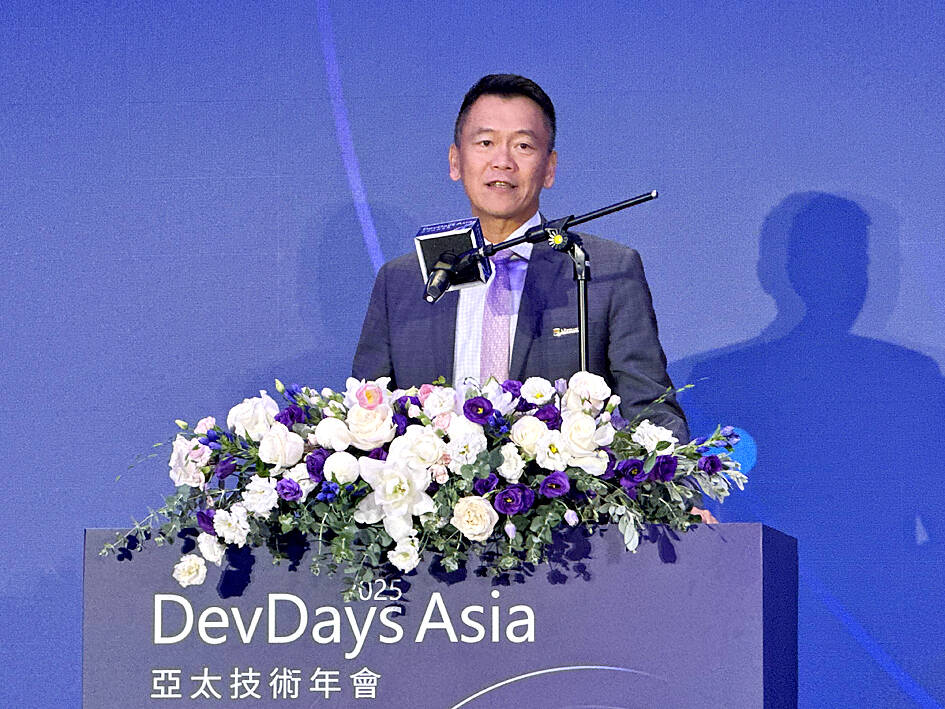Microsoft Corp yesterday said it plans to expand its data center deployment and artificial intelligence (AI) services in Taiwan to match fast-growing demand from local vertical industries as AI applications gain traction.
The Redmond, Washington-based cloud service provider enabled its first phase of its Azure data center in Taiwan last year, allowing early adotping customers to access its cloud and AI services, four years after it announced a mega data center investment in 2020.
The Taiwan Azure “data center region” would comprise three to four data centers, Microsoft said.

Photo: CNA
“After we enabled the first of our one-plus-one data center projects last year, we hope to introduce three-to-plue-one data center projects very soon,” Microsoft Taiwan Corp general manager Sean Pien (卞志祥) told reporters on the sidelines of a media briefing yesterday.
The investment helped Microsoft fully deliver Microsoft’s cloud and AI services to local enterprises by overcoming regulatory barriers barring data collected locally from being stored overseas, Pien said.
Microsoft’s data center customers are from almost all sectors, including government agencies, medical institutions, financial service providers and telecoms, which are usually the last adopters of cloud-based AI services due to data security and privacy concerns, he said.
Early adopters, such as technology companies, embrace high-performance computing and real-time inference applications for on-site devices, he said.
More than 200 functions or applications are available for Microsoft’s customers in Taiwan, he said.
The number of functions matches the offerings from Microsoft’s data centers elsewhere in the world, he said.
Microsoft said it is not worried about the connectivity resilience of its data centers, as Taiwan operates more submarine cables than most people imagine, Pien said in response to a question about the risk of connection disruptions after several subsea cables connecting Taiwan to other regions were sabotaged in the past few months, with some cut by Chinese vessels.
Microsoft plans to utilize medium Earth orbit and low Earth orbit satellites to enhance connectivity resilience, he said.
Although the services of SpaceX’s Starlink are not available in Taiwan, Pien said there are other options.
Meanwhile, Nvidia Corp’s investment in OpenAI to build a 10 gigawatt AI data center sent a positive message, Pien said.
The deal indicates that AI applications have gained traction as the world’s major technology firms start investing in AI infrastructure again, he said.
Microsoft’s partnerships with OpenAI are strong, he added.
Microsoft remains the major AI computing power supporter for OpenAI and the first company offering AI applications based on the latest language models developed by OpenAI, Pien said.

In Italy’s storied gold-making hubs, jewelers are reworking their designs to trim gold content as they race to blunt the effect of record prices and appeal to shoppers watching their budgets. Gold prices hit a record high on Thursday, surging near US$5,600 an ounce, more than double a year ago as geopolitical concerns and jitters over trade pushed investors toward the safe-haven asset. The rally is putting undue pressure on small artisans as they face mounting demands from customers, including international brands, to produce cheaper items, from signature pieces to wedding rings, according to interviews with four independent jewelers in Italy’s main

Japanese Prime Minister Sanae Takaichi has talked up the benefits of a weaker yen in a campaign speech, adopting a tone at odds with her finance ministry, which has refused to rule out any options to counter excessive foreign exchange volatility. Takaichi later softened her stance, saying she did not have a preference for the yen’s direction. “People say the weak yen is bad right now, but for export industries, it’s a major opportunity,” Takaichi said on Saturday at a rally for Liberal Democratic Party candidate Daishiro Yamagiwa in Kanagawa Prefecture ahead of a snap election on Sunday. “Whether it’s selling food or

CONCERNS: Tech companies investing in AI businesses that purchase their products have raised questions among investors that they are artificially propping up demand Nvidia Corp chief executive officer Jensen Huang (黃仁勳) on Saturday said that the company would be participating in OpenAI’s latest funding round, describing it as potentially “the largest investment we’ve ever made.” “We will invest a great deal of money,” Huang told reporters while visiting Taipei. “I believe in OpenAI. The work that they do is incredible. They’re one of the most consequential companies of our time.” Huang did not say exactly how much Nvidia might contribute, but described the investment as “huge.” “Let Sam announce how much he’s going to raise — it’s for him to decide,” Huang said, referring to OpenAI

The global server market is expected to grow 12.8 percent annually this year, with artificial intelligence (AI) servers projected to account for 16.5 percent, driven by continued investment in AI infrastructure by major cloud service providers (CSPs), market researcher TrendForce Corp (集邦科技) said yesterday. Global AI server shipments this year are expected to increase 28 percent year-on-year to more than 2.7 million units, driven by sustained demand from CSPs and government sovereign cloud projects, TrendForce analyst Frank Kung (龔明德) told the Taipei Times. Demand for GPU-based AI servers, including Nvidia Corp’s GB and Vera Rubin rack systems, is expected to remain high,